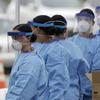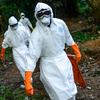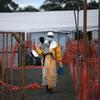Miles O'Brien appears in the following:
Fake COVID Testing Sites, Cannabis And Exercise, Electric Aviation
Friday, January 28, 2022
Saving Manatees, Nighttime Satellite Streaks, Webb Telescope Update
Friday, January 28, 2022
Frontline's Coronavirus Documentary
Tuesday, April 21, 2020
Juno Makes It to Jupiter
Wednesday, July 06, 2016
EgyptAir Disaster Raises The Stakes for The Middle East
Friday, May 20, 2016
New Case of Ebola Emerges in Sierra Leone
Friday, January 15, 2016
Lessons Learned from the Ebola Outbreak
Friday, June 12, 2015
High Tech Tools and the Hunt for the Boston Bombers
Wednesday, May 29, 2013
Understanding the Brains of Mass Killers
Tuesday, February 19, 2013
New Planes from Boeing Grounded Amid Safety Concerns
Friday, January 18, 2013
A Third of Americans Can't Afford a Dentist
Tuesday, June 26, 2012
Transit of Venus Visible in Today's Sky
Tuesday, June 05, 2012
Seeing the transit of Venus is a twice-in-a-lifetime opportunity. There was a transit in 2004 and another one will occur tonight. If you miss that, you'll have to wait (and live) until 2117 to see it again.
Is the Private Era in Space Officially Upon Us?
Wednesday, May 23, 2012
Frontline Doc Looks at Fukushima and Nuclear Energy
Tuesday, January 17, 2012
The earthquake and tsunami that devastated Japan's Fukushima Daiichi nuclear power plant last year brought attention to the safety risks associated with atomic energy. Before Fukushima, nuclear energy was on the rise and many countries developed plans to build more power plants. But after the disaster, nuclear energy became a subject of international debate and countries like Japan and Germany started to shut down reactors. How should the United States deal with nuclear energy?
Top of the Hour:The Iraq War Legacy, Morning Headlines
Thursday, August 19, 2010
The last U.S. combat troops left Iraq early this morning. 50,000 non-combat forces will remain. What else will we leave behind, and what is the continuing legacy of the war? We're joined by Christian Science Monitor correspondent Jane Arraf. That and this morning's headlines.
Top of the Hour: The End of Combat Troops in Iraq; This Morning's Headlines
Thursday, August 19, 2010
The last U.S. combat troops in Iraq have left the country...now what? What is the legacy of the Iraq War, and what comes next? That and this morning's headlines.
Top of the Hour: Israeli Ambassador to the US; This Morning's Headlines
Friday, June 04, 2010
Israel's ambassador to the U.S. Michael Oren says that the flotilla headed to Gaza was populated by "hired thugs." That and this morning's top headlines.
Top of the Hour: Israel and Gaza; This Morning's Headlines
Friday, June 04, 2010
The latest incident in the conflict between Israelis and Palestinians brings the difficulty of creating peace in the area into sharp relief. We ask Vanity Fair's Rich Cohen about more cargo ships approaching Israel's blockade of Gaza; that and this morning's headlines.
Modernizing the Airplane: GPS to Replace Radar
Wednesday, March 24, 2010
The Senate passed a $34.5 billion bill on Monday that will bring in GPS technology to replace radar. This is an attempt to help modernize our country’s dated air traffic control system. Science and aviation reporter Miles O’Brien explains the new system and why it's only happening now.
The Genius in All of Us
Monday, March 08, 2010
When you hear the word "genius," you might think of Einstein, Mozart, or Da Vinci. But how they became geniuses is the subject of debate. Where they born that way? Or does it come from sheer tenacity?
We begin a week-long conversation about genius and how any of us can get that way. David Shenk, author of "The Genius in All of Us: Why Everything You've Been Told about Genetics, Talent, and IQ is Wrong," tells us about some surprising research about what it takes to, as he puts it, "get good at stuff." Turns out it's not as hard as you might think.
Segment : [2F] SLUG: [GENIUS] [CH] leads
Guest: David Shenk, author of “The Genius in All of Us”.
Location: IN STUDIO
Please pay attention to the arc – it’s important that we hit on Mozart at the end. Also please note that there is a lot of audio pulled to pepper in over this series – a well of “geniuses on genius” to draw from.
ROLES (if they exist)
David Shenk will intro the ideas behind the book/the week - a debunking of “genius” as an inborn trait, in favor of the idea that high achievement comes from the interplay of genes and experience.
Betty Hart (prerecord) will support this claim with her research. She discovered that early intelligence is *highly* correlated with the number of words spoken in the home.
Jim Flynn (prerecord) will support this claim with his research. He discovered that, in the last century, the average worldwide IQs rose dramatically.
ARC
--straw man (genius is from god/genes)
--genes aren’t destiny - state thesis (genes x experience)
--intelligence can grow - support thesis (pre-record audio)
--practice is key - (Mozart)
--tomorrow, we’ll talk to a genius.
INTRO
TKTKTK [JAY COWIT] BRANDING SOUND FOR GENIUS HOUR
“MUX MUX MUX...”
We can all agree on who the geniuses are - Einstein, Mozart, Da Vinci, Edison. But where does that genius come from? Is it a gift from god? Is it in our genes? And - here's the question that's important to all of us - are only a select few chosen to excel, while the rest of us are doomed to mediocrity? Not so, says David Shenk. He’s the author of “The Genius in All of Us: Why Everything You’ve Been Told About Genetics, Talent and IQ is Wrong”. This week, all week long, David Shenk will join us in a conversation, here and on the website at thetakeaway.org, about how we can *all* tap into our own extraordinary abilities.
QUESTIONS
David, you don’t hear so much, anymore, about talent coming from God. But you do hear a lot about genes. When my child was born, people said, oh, he’s got your eyes, or your nose, and when he does something great, I’m tempted to say, oh, he got that from me. But your book seems to say that that idea isn’t *quite* right.
[yes, genes are nothing without expression – without experience.]
So, when people visit the sperm bank and choose a smart man… does that ensure they’re going to have a smart child?
[not really. There is no *smart*ness in genes. It’s a lot about how you help those genes be developed]
But it’s true that some kids just do better in school, right from the start. We recently talked to a researcher you mentioned in her book. Her name is Betty Hart, and she was trying to figure out what happened in the years before pre-school that made some students much better prepared.
GENIUS 1 HART OBSERVED – 11s
BETTY HART, PRE-RECORD, HOME IN KANSAS
“we observed for an hour a day and recorded all the talk that went on. some parents talked very little to the kids, some parents talked huge, huge amounts, as you can see from the numbers...”
David, what were those numbers, and why do they matter?
[it’s not about smart people inheriting smart genes, it’s about early exposure.]
So, just how smart can we get? David, in your book you speak to a researcher named Jim Flynn. We talked to him earlier about some work he did, comparing IQ scores over the last century – and here’s what he discovered.
GENIUS 2 FLYNN IQGROWTH – 22s
JIM FLYNN, PRE-RECORD, HOME IN NEW ZEALAND
“IQ gains were moving at about 3 points a decade. well, over a hundred years, that would be thirty points, wouldn't it? well, if our grandparents were 30 points below us, that would put them at 70. and 70 is the cutoff point for mental retardation. and that hardly seemed to make any sense..”
David, what does he mean by that?
[our brains are plastic, the parts we use get much bigger and better.]
So, if genius isn't something that's just *given*, what does it take to *attain* genius?
[well, not so much. Mozart got his gift from quite a lot of practice]
For more on this idea, visit our website where you can read an excerpt from the book. Or you can email us with questions, at TKTKTK. David will be answering those on the site.
Well, tomorrow we’ll talk to someone who really took that challenge to heart. We'll speak to Sarah Chang, a concert violinist who first picked up the violin at age 4.
AUDIO AVAILABLE (TOP BEST CUTS):
GENIUS 3 FLYNN DOGSRABBITS – 21s
JIM FLYNN, PRE-RECORD, HOME IN NEW ZEALAND
“and the solution that I hit on was that it's not so much that we're brighter than they are, but that we've put on scientific spectacles. you see if you asked a kid in 1900 what dogs and rabbits have in common, they'd say you use dogs to hunt rabbits. well that's the wrong answer. you're supposed to say they're both mammals.”
GENIUS 4 FLYNN SMARTER – 15s
JIM FLYNN, PRE-RECORD, HOME IN NEW ZEALAND
ASKED: SO HAVE WE GOTTEN SMARTER IN 100 years?
“if you mean are we exercising parts of our brain that we didn't exercise in 1900, for example the parts that deal with abstractions and logic, then probably under a microscope would look a little different.”
GENIUS 5 HART MESSAGE – 12s
BETTY HART, PRE-RECORD, HOME IN KANSAS
“it's an important message. that people realize that they can't count on capacity. they've got to do their part! tell the kids about things..”
FACTS (if any)
page #s
p 35-37 Jim Flynn’s study
p 37-39 Betty Hart’s study
p 50-51 Mozart story
ARTICLE (if any)
















